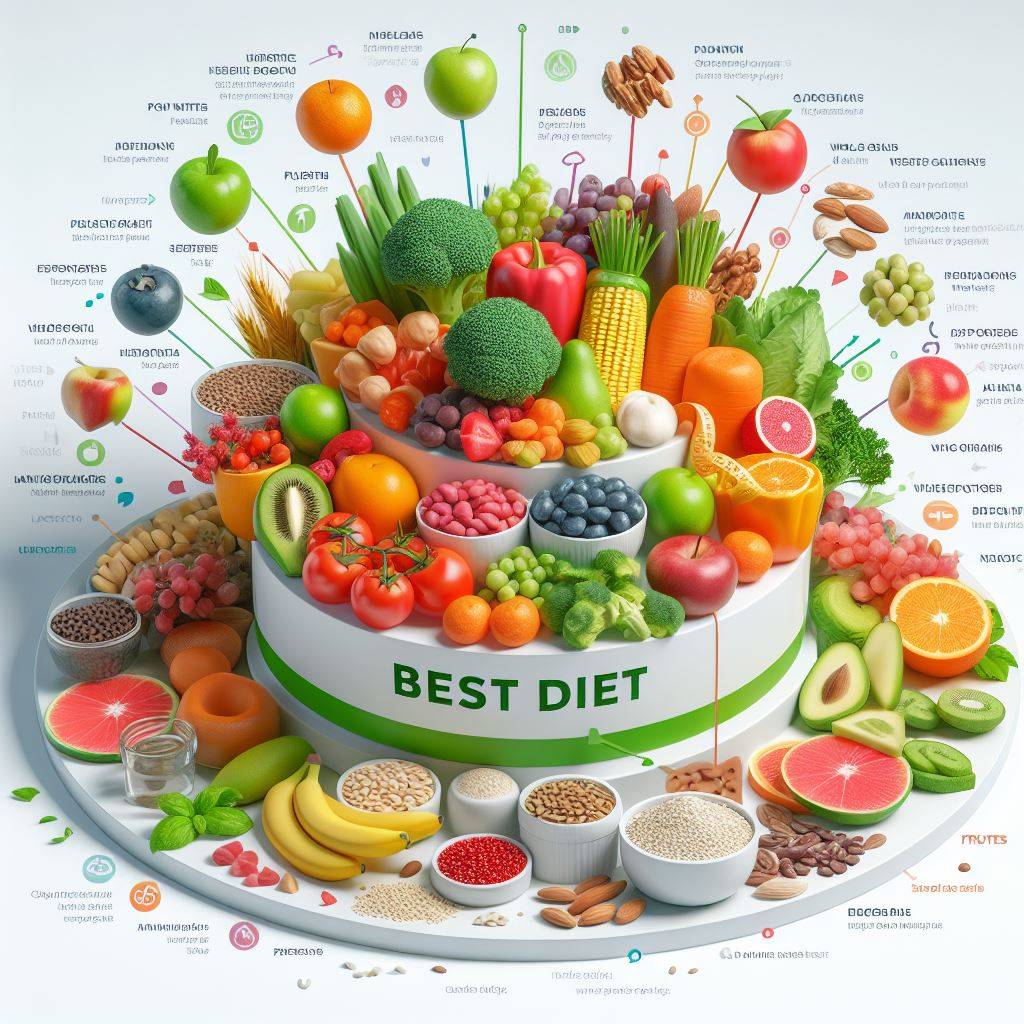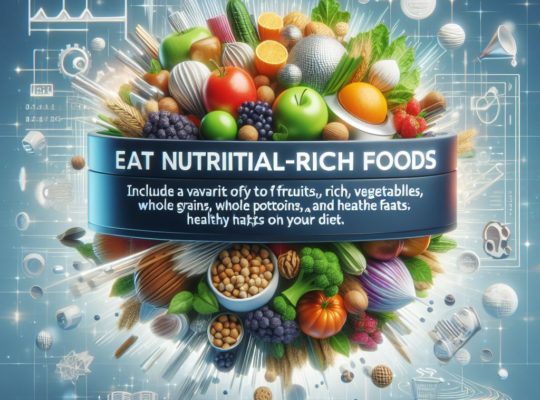In today’s world, where health and wellness are increasingly becoming priorities, finding the right diet plan can be a daunting task. With so many options available, it’s crucial to choose a diet that not only helps you achieve your health goals but also promotes overall well-being. In this comprehensive guide, we’ll explore nine of the best diet plans that prioritize your overall health, taking into account factors like nutrition, sustainability, and scientific evidence.
1. The Mediterranean Diet
Introduction to the Mediterranean diet, known for its emphasis on whole foods, fruits, vegetables, and healthy fats.
Explanation of its benefits for heart health, weight management, and longevity.
Tips for incorporating Mediterranean-inspired meals into your daily routine.
Embracing the Mediterranean Diet: A Pathway to Health and Longevity
In a world inundated with fad diets and conflicting nutritional advice, the Mediterranean diet stands out as a beacon of simplicity and sustainability. Rooted in the culinary traditions of countries bordering the Mediterranean Sea, this dietary pattern emphasizes whole foods, fresh produce, and heart-healthy fats. In this blog post, we’ll explore the principles of the Mediterranean diet, its numerous health benefits, and practical tips for incorporating Mediterranean-inspired meals into your daily routine.
The Essence of the Mediterranean Diet:
At its core, the Mediterranean diet is characterized by an abundance of plant-based foods such as fruits, vegetables, whole grains, legumes, nuts, and seeds. These nutrient-rich ingredients form the foundation of meals, providing essential vitamins, minerals, antioxidants, and dietary fiber. In addition to plant foods, the Mediterranean diet includes moderate consumption of lean proteins, primarily from sources like fish, poultry, and dairy products, with limited intake of red meat.
Healthy Fats Take Center Stage:
One of the defining features of the Mediterranean diet is its emphasis on healthy fats, particularly those found in olive oil, nuts, and fatty fish. Extra virgin olive oil, in particular, is a cornerstone of Mediterranean cuisine, prized for its rich flavor and potent health benefits. Rich in monounsaturated fats and antioxidants, olive oil has been linked to reduced inflammation, improved cholesterol levels, and protection against heart disease.
Benefits for Heart Health, Weight Management, and Longevity:
Numerous studies have demonstrated the impressive health benefits associated with the Mediterranean diet. From reducing the risk of heart disease and stroke to promoting weight loss and supporting overall longevity, this dietary pattern offers a holistic approach to health and well-being. The abundance of fiber-rich foods helps promote satiety and weight management, while the inclusion of heart-healthy fats and antioxidants supports cardiovascular health and cellular function.
Practical Tips for Incorporating Mediterranean-Inspired Meals:
Incorporating Mediterranean-inspired meals into your daily routine doesn’t have to be complicated or time-consuming.
Here are some practical tips to help you embrace the flavors and benefits of the Mediterranean diet:
- Start by incorporating more fruits and vegetables into your meals, aiming for a colorful variety of produce with each plate.
- Use olive oil as your primary source of fat for cooking, salad dressings, and drizzling over roasted vegetables or whole grains.
- Include fish in your diet at least twice a week, opting for fatty fish like salmon, mackerel, or sardines, which are rich in omega-3 fatty acids.
- Experiment with whole grains such as quinoa, brown rice, farro, or barley as nutritious alternatives to refined grains.
Snack on nuts and seeds for a satisfying boost of protein, healthy fats, and essential nutrients. - Prioritize fresh, minimally processed foods over packaged and convenience foods, focusing on seasonal and locally sourced ingredients whenever possible.
The Mediterranean diet offers a refreshing approach to nourishing your body and promoting overall health and longevity. By embracing the principles of this time-tested dietary pattern—emphasizing whole foods, fruits, vegetables, and healthy fats—you can embark on a journey toward improved well-being and vitality. Whether you’re looking to support heart health, manage weight, or simply enjoy delicious and nutritious meals, the Mediterranean diet provides a roadmap for sustainable and enjoyable eating habits. So why not savor the flavors of the Mediterranean and reap the rewards of a healthier lifestyle?
2. The DASH Diet:
Overview of the Dietary Approaches to Stop Hypertension (1f4a8_dashsymbol) diet, designed to lower blood pressure and reduce the risk of heart disease.
Discussion of its emphasis on fruits, vegetables, lean proteins, and low-fat dairy products.
Tips for following the DASH diet while maintaining flavor and variety in your meals.
Discovering the DASH Diet: A Blueprint for Heart Health
In a world where heart disease remains a leading cause of mortality, finding effective strategies to support cardiovascular health is paramount. Enter the Dietary Approaches to Stop Hypertension (1f4a8_dashsymbol) diet—a scientifically-backed eating plan renowned for its ability to lower blood pressure and reduce the risk of heart disease. In this blog post, we’ll delve into the principles of the DASH diet, its focus on wholesome foods, and practical tips for incorporating its heart-healthy guidelines into your daily meals.
Unveiling the DASH Diet:
The DASH diet is not just another passing trend; it’s a well-researched and evidence-based dietary pattern endorsed by healthcare professionals and nutrition experts alike. Originally developed to combat hypertension, the DASH diet has since gained recognition for its broader cardiovascular benefits. At its core, the DASH diet emphasizes nutrient-rich foods that are known to support heart health, including fruits, vegetables, lean proteins, and low-fat dairy products.
Emphasis on Wholesome Foods:
Central to the DASH diet is the abundant consumption of fruits and vegetables, which are packed with vitamins, minerals, and antioxidants. These colorful plant foods provide essential nutrients while also contributing to satiety and overall well-being. In addition to produce, the DASH diet encourages the inclusion of lean proteins such as poultry, fish, and legumes, as well as low-fat dairy products like yogurt and cheese. By prioritizing these wholesome foods, the DASH diet helps individuals maintain a balanced and heart-healthy eating pattern.
Tips for Flavorful and Varied Meals:
Following the DASH diet doesn’t mean sacrificing flavor or culinary enjoyment. With a bit of creativity and strategic planning, you can create delicious and satisfying meals that align with DASH guidelines.
Here are some tips to help you navigate the DASH diet while maintaining flavor and variety:
- Experiment with herbs, spices, and citrus zest to add flavor to your meals without relying on excess salt or sodium.
- Incorporate a variety of fruits and vegetables into your diet, aiming for different colors and textures to keep your meals exciting.
- Choose lean cuts of meat and poultry, and opt for cooking methods like grilling, baking, or steaming to keep them tender and flavorful.
- Explore plant-based protein sources such as beans, lentils, tofu, and tempeh as nutritious alternatives to animal products.
- Swap out high-fat dairy products for their lower-fat counterparts, such as skim milk, Greek yogurt, and reduced-fat cheese.
- Get creative with meal planning and preparation, trying out new recipes and meal combinations to keep your taste buds engaged.
The DASH diet offers a practical and effective approach to promoting heart health and reducing the risk of cardiovascular disease. By emphasizing wholesome foods like fruits, vegetables, lean proteins, and low-fat dairy products, the DASH diet provides a blueprint for nutritious eating that is both flavorful and satisfying. Whether you’re looking to lower blood pressure, improve cholesterol levels, or simply adopt healthier eating habits, the DASH diet offers a roadmap to a heart-healthy lifestyle. So why not embark on this journey toward better health and vitality today?
3. The Flexitarian Diet:
Introduction to the flexitarian diet, which emphasizes plant-based foods while allowing occasional meat and dairy consumption.
Explanation of its benefits for health, sustainability, and weight management.
Tips for transitioning to a more plant-based diet and incorporating meatless meals into your routine.
Embracing Flexibility: The Flexitarian Diet for Health and Sustainability
In a world where dietary choices can have profound impacts on both personal health and environmental sustainability, the flexitarian diet emerges as a flexible and forward-thinking approach to eating. Blending the best of plant-based nutrition with occasional animal products, the flexitarian diet offers individuals the freedom to prioritize health, reduce their environmental footprint, and enjoy a varied and flavorful diet. In this blog post, we’ll explore the principles of the flexitarian diet, its numerous benefits for health and sustainability, and practical tips for transitioning to this flexible eating pattern.
Understanding the Flexitarian Diet:
At its core, the flexitarian diet is a predominantly plant-based eating pattern that encourages the consumption of fruits, vegetables, whole grains, legumes, nuts, and seeds. Unlike strict vegetarian or vegan diets, however, flexitarianism allows for occasional inclusion of meat, poultry, fish, and dairy products. This flexibility makes the flexitarian diet accessible to a wide range of individuals, catering to different preferences, cultural backgrounds, and nutritional needs.
Benefits for Health, Sustainability, and Weight Management:
The flexitarian diet offers a multitude of benefits for both individuals and the planet. From improving overall health and reducing the risk of chronic diseases to mitigating the environmental impact of food production, flexitarianism aligns with principles of health and sustainability. By prioritizing plant-based foods, flexitarians enjoy a diet rich in fiber, vitamins, minerals, and phytonutrients, which can support cardiovascular health, weight management, and overall well-being. Additionally, reducing reliance on animal products can help decrease greenhouse gas emissions, conserve natural resources, and promote ethical and sustainable food systems.
Tips for Transitioning to a Flexitarian Diet:
Transitioning to a flexitarian diet doesn’t have to be daunting or overwhelming. With gradual changes and a bit of experimentation, you can successfully incorporate more plant-based foods into your routine while still enjoying the occasional indulgence.
Here are some tips to help you embrace the flexitarian lifestyle:
Start by incorporating Meatless Mondays or other meat-free days into your week to gradually reduce reliance on animal products.
- Experiment with new plant-based recipes and ingredients, exploring different cuisines and flavor profiles to keep meals exciting and satisfying.
- Focus on filling your plate with a variety of colorful fruits, vegetables, whole grains, and legumes, aiming for a balanced and nutritious diet.
- When consuming animal products, choose high-quality, sustainably sourced options whenever possible, prioritizing lean proteins like fish, poultry, and eggs.
- Be mindful of portion sizes and listen to your body’s hunger and fullness cues, aiming for moderation and balance in your eating habits.
- Don’t be afraid to indulge in occasional treats or special occasions, recognizing that flexibility and enjoyment are key aspects of the flexitarian lifestyle.
The flexitarian diet offers a flexible and inclusive approach to eating that promotes health, sustainability, and culinary enjoyment. By prioritizing plant-based foods while allowing for occasional meat and dairy consumption, flexitarians can enjoy a varied and flavorful diet that aligns with their values and goals. Whether you’re looking to improve your health, reduce your environmental impact, or simply explore new culinary horizons, the flexitarian diet offers a pathway to balanced and sustainable eating habits. So why not embrace flexibility and embark on a journey toward a healthier, more sustainable lifestyle today?
4. The Mediterranean-DASH Intervention for Neurodegenerative Delay (MIND) Diet:
Overview of the MIND diet, which combines elements of the Mediterranean and DASH diets with a focus on brain health.
Discussion of its potential benefits for cognitive function and reducing the risk of neurodegenerative diseases like Alzheimer’s.
Tips for incorporating MIND diet principles into your daily meals to support brain health.
Nourishing Your Mind: Exploring the MIND Diet for Brain Health
In an era where cognitive decline and neurodegenerative diseases are on the rise, prioritizing brain health has never been more important. Enter the MIND diet—a unique eating pattern that combines elements of the Mediterranean and DASH diets with a specific focus on promoting cognitive function and reducing the risk of neurodegenerative diseases like Alzheimer’s. In this blog post, we’ll delve into the principles of the MIND diet, its potential benefits for brain health, and practical tips for incorporating MIND diet principles into your daily meals to nourish your mind and protect cognitive function.
Unveiling the MIND Diet:
The MIND diet, short for Mediterranean-DASH Intervention for Neurodegenerative Delay, is a hybrid eating pattern that draws inspiration from two well-established dietary approaches—the Mediterranean diet and the DASH diet. Developed by researchers at Rush University Medical Center, the MIND diet places a special emphasis on foods and nutrients that have been shown to support brain health and cognitive function. By combining elements of these two diets and incorporating specific brain-boosting foods, the MIND diet offers a unique and targeted approach to nourishing the mind.
Benefits for Cognitive Function and Neuroprotection:
The MIND diet has garnered attention for its potential benefits in preserving cognitive function and reducing the risk of neurodegenerative diseases such as Alzheimer’s disease. Research suggests that the MIND diet’s emphasis on nutrient-rich foods like leafy greens, berries, nuts, whole grains, and fatty fish may help protect against age-related cognitive decline and delay the onset of Alzheimer’s disease. Additionally, the MIND diet’s focus on heart-healthy fats, antioxidants, and anti-inflammatory foods aligns with principles of brain health and neuroprotection.
Tips for Incorporating MIND Diet Principles:
Incorporating MIND diet principles into your daily meals doesn’t have to be complicated or restrictive. With a few simple strategies and substitutions, you can nourish your brain and support cognitive function while enjoying delicious and satisfying meals.
Here are some tips for embracing the MIND diet:
- Prioritize plant-based foods such as leafy greens, berries, nuts, and whole grains, which are rich in vitamins, minerals, antioxidants, and phytonutrients that support brain health.
- Include fatty fish like salmon, trout, and mackerel in your diet regularly to benefit from their omega-3 fatty acids, which have been linked to improved cognitive function and reduced risk of dementia.
- Limit your intake of red meat, processed foods, and sweets, which are associated with inflammation and may negatively impact brain health.
- Enjoy a variety of colorful fruits and vegetables, aiming for different hues and textures to maximize your intake of brain-boosting nutrients.
- Experiment with herbs and spices like turmeric, cinnamon, and ginger, which have anti-inflammatory and antioxidant properties that may support cognitive function.
- Stay hydrated by drinking plenty of water throughout the day, as even mild dehydration can impair cognitive performance and brain function.
The MIND diet offers a targeted and evidence-based approach to supporting brain health and reducing the risk of neurodegenerative diseases like Alzheimer’s. By incorporating elements of the Mediterranean and DASH diets with a specific focus on brain-boosting foods, the MIND diet provides a roadmap to nourishing your mind and protecting cognitive function as you age. Whether you’re looking to enhance memory, sharpen focus, or simply maintain brain health, the MIND diet offers a practical and delicious way to support your cognitive well-being. So why not nourish your mind and embrace the MIND diet today?
5. The Plant-Based Diet:
Introduction to plant-based diets, which prioritize fruits, vegetables, grains, legumes, and nuts while minimizing or eliminating animal products.
Explanation of the health benefits associated with plant-based eating, including reduced risk of chronic diseases and improved longevity.
Tips for transitioning to a plant-based diet and ensuring adequate nutrient intake.
Plant-Powered Living: Embracing the Health Benefits of a Plant-Based Diet
In a world where chronic diseases like heart disease, diabetes, and obesity are on the rise, the importance of adopting a healthful diet cannot be overstated. Enter the plant-based diet—a dietary approach that prioritizes whole, plant-derived foods while minimizing or eliminating animal products. In this blog post, we’ll explore the principles of the plant-based diet, its myriad health benefits, and practical tips for transitioning to this nourishing and sustainable way of eating.
Understanding Plant-Based Diets:
At its core, a plant-based diet revolves around consuming foods that come from plants, including fruits, vegetables, whole grains, legumes, nuts, and seeds. While some individuals may choose to eliminate animal products entirely (as in a vegan diet), others may include small amounts of animal-derived foods (as in a vegetarian or flexitarian diet). Regardless of the specific variation, plant-based eating places plants at the center of the plate, emphasizing their health-promoting properties and nutritional value.
Health Benefits of Plant-Based Eating:
Numerous studies have linked plant-based diets to a wide range of health benefits, making them a powerful tool for disease prevention and longevity. By prioritizing nutrient-rich plant foods, individuals can enjoy reduced risk of chronic diseases such as heart disease, diabetes, certain cancers, and obesity. Additionally, plant-based diets are associated with lower blood pressure, improved cholesterol levels, better weight management, and enhanced overall well-being. The abundance of fiber, vitamins, minerals, antioxidants, and phytonutrients found in plant foods plays a key role in promoting optimal health and vitality.
Tips for Transitioning to a Plant-Based Diet:
Transitioning to a plant-based diet can seem daunting at first, especially if you’re accustomed to a diet rich in animal products. However, with the right approach and mindset, adopting a plant-based lifestyle can be both achievable and enjoyable.
Here are some tips to help you make the transition:
- Start slowly by gradually increasing the amount of plant-based foods in your diet while reducing your intake of animal products.
- Experiment with new fruits, vegetables, grains, legumes, nuts, and seeds to discover new flavors and textures.
- Focus on incorporating a variety of plant foods into your meals to ensure you’re getting a wide range of nutrients.
- Replace meat with plant-based protein sources such as tofu, tempeh, seitan, beans, lentils, and chickpeas.
- Get creative in the kitchen by exploring plant-based recipes and cooking techniques that highlight the natural flavors of plant foods.
- Pay attention to your body’s hunger and fullness cues, and eat mindfully to ensure you’re meeting your nutrient needs on a plant-based diet.
A plant-based diet offers a powerful and sustainable approach to nourishing your body, supporting optimal health, and reducing your environmental footprint. By prioritizing whole, plant-derived foods while minimizing or eliminating animal products, you can enjoy a wide range of health benefits and contribute to a more sustainable and compassionate food system. Whether you’re motivated by health, environmental concerns, or ethical considerations, embracing a plant-based diet can be a transformative journey toward vibrant health and well-being. So why not join the plant-powered revolution and discover the joys of plant-based living today?
6. The Whole30 Program:
Overview of the Whole30 program, a 30-day elimination diet designed to reset your body and identify potential food sensitivities.
Discussion of its rules, which involve avoiding sugar, alcohol, grains, legumes, dairy, and processed foods.
Tips for successfully completing the Whole30 program and reintroducing eliminated foods afterward.
Resetting Your Health: A Guide to the Whole30 Program
In a world where processed foods, sugar-laden treats, and dietary sensitivities abound, finding a way to reset your body and identify potential food triggers can be a game-changer for your health and well-being. Enter the Whole30 program—a 30-day elimination diet designed to help you discover which foods may be negatively impacting your health and vitality. In this blog post, we’ll delve into the principles of the Whole30 program, its rules and guidelines, and practical tips for successfully completing the program and reintroducing eliminated foods afterward.
Understanding the Whole30 Program:
The Whole30 program is not just another diet; it’s a transformative approach to eating that focuses on whole, nutrient-dense foods while eliminating potentially inflammatory or allergenic ingredients. For 30 days, participants commit to removing certain food groups from their diet, including sugar, alcohol, grains, legumes, dairy, and processed foods. By following these strict guidelines, the Whole30 program aims to reset your body, reduce inflammation, balance blood sugar levels, and identify potential food sensitivities or intolerances.
Rules of the Whole30 Program:
The rules of the Whole30 program are straightforward but stringent. Participants are required to abstain from the following foods and ingredients for the duration of the 30-day program:
- Sugar and sweeteners, including natural and artificial sources.
- Alcohol in any form, including wine, beer, and spirits.
- Grains, including wheat, rice, oats, barley, corn, and quinoa.
- Legumes, such as beans, lentils, peanuts, and soy products
- .
Dairy products, including milk, cheese, yogurt, and butter. - Processed foods, including additives, preservatives, and artificial ingredients.
Tips for Successfully Completing the Whole30 Program:
Completing the Whole30 program requires commitment, preparation, and a willingness to embrace change.
Here are some tips to help you navigate the program and maximize your success:
- Plan ahead by stocking your kitchen with Whole30-compliant foods and meal ingredients.
- Focus on whole, unprocessed foods like fruits, vegetables, lean proteins, and healthy fats to keep meals satisfying and nutritious.
- Experiment with new recipes and cooking techniques to keep meals interesting and flavorful.
- Stay hydrated by drinking plenty of water throughout the day to support detoxification and hydration.
- Lean on community support by joining online forums, social media groups, or local Whole30 meetups for encouragement and accountability.
- Practice self-care by prioritizing sleep, stress management, and regular physical activity to support your overall well-being during the program.
Reintroducing Eliminated Foods:
After completing the 30-day Whole30 program, participants have the option to reintroduce eliminated foods one at a time to identify potential sensitivities or triggers. It’s essential to reintroduce foods systematically and mindfully, paying attention to any changes in symptoms or how your body responds. By reintroducing foods gradually and observing any reactions, you can gain valuable insights into how different foods impact your health and make informed dietary choices moving forward.
The Whole30 program offers a powerful and transformative approach to resetting your body, identifying potential food sensitivities, and embracing a healthier way of eating. By following the program’s rules and guidelines, participants can experience improved energy levels, reduced inflammation, and a greater understanding of their individual dietary needs. Whether you’re looking to jumpstart your health journey, break free from unhealthy eating habits, or uncover the root cause of mysterious symptoms, the Whole30 program provides a roadmap to better health .








